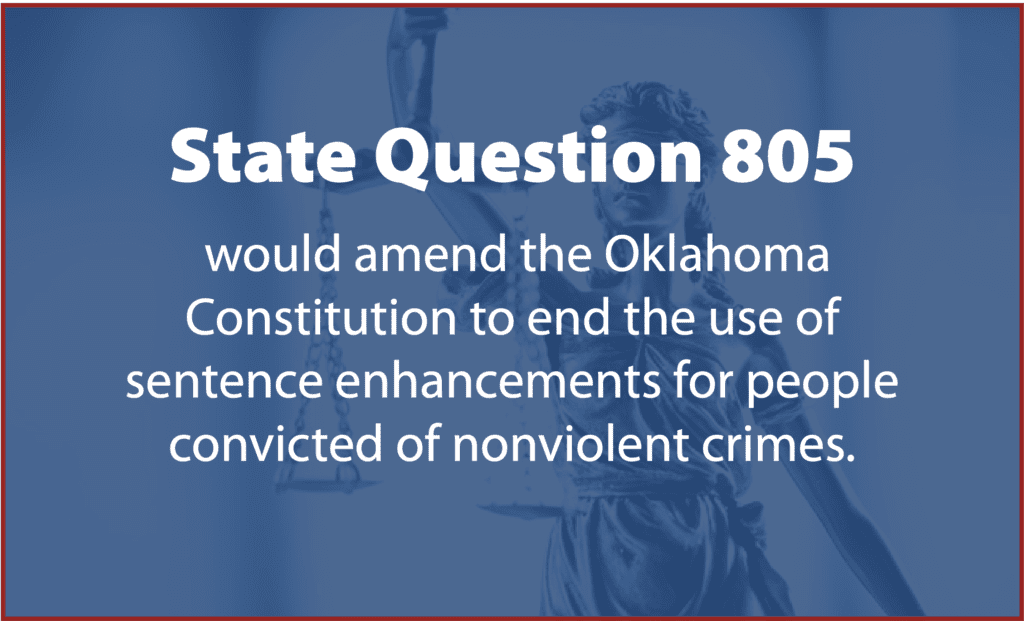No other ballot initiative in recent Oklahoma history has been as hotly contested or caused as much confusion as State Question 805. Proponents and opponents of the ballot measure have promulgated conflicting information on both social media and over the airwaves.
SQ 805 is a ballot initiative that would amend the Oklahoma Constitution to end the use of sentence enhancements for repeat offenders convicted of nonviolent crimes. Sentence enhancements are when there are facts or circumstances in a crime that allow a judge to extend a sentence beyond the maximum specified sentence.
Oklahoma is one of 11 states where a citizen-initiated constitutional amendment cannot
be altered or repealed by the legislature. Any modification to SQ 805 must be done by a vote of the people through a separate ballot initiative.
Under the provisions of SQ 805, people convicted of nonviolent felonies could still receive the maximum sentence specified for that crime, but they would not receive sentence enhancements based on prior convictions. This measure would allow people presently in prison for nonviolent convictions who have received a sentence enhancement to petition the court to have their sentences reduced.
Under current state law, if a person has no prior felony convictions or more than 10 years has passed since they completed a sentence for a felony conviction, they must be sentenced within the range of punishment established by the state legislature.
However, if a person charged with a felony has one or more previous felony convictions within the 10-year window, a district attorney can request an enhanced sentence be handed down that surpasses the maximum punishment given to a first-time offender.
If the maximum sentence for a first-time offense is greater than five years, a person with a felony record could receive a sentence ranging from twice the minimum sentence set by law up to life in prison. If there is no minimum sentence for the first offense, the prescribed mandatory minimum for a second offense is two years.
If the maximum punishment for a first-time offender is five years or less in prison, a repeat felony offender with a prior felony conviction could be sentenced to no more than 10 years.
A criminal defendant with two or more prior felony convictions can receive a sentence anywhere from three times the minimum sentence up to life in prison. A person need not be charged with the same crime twice in order for their sentence to be extended.
Under SQ 805, district attorneys would be unable to seek a sentence enhancement against a person who does not have a prior violent felony conviction. SQ 805 defines violent felonies as those offenses specified in Section 571 of Title 57 of the Oklahoma Statutes on January 1, 2020. A person convicted of a violent felony who is subsequently charged with a nonviolent felony can still have his or her sentence enhanced under SQ805.
There are several crimes listed as nonviolent under Title 57 that have questionable interpretations, such as: Domestic Abuse in the Presence of a Child, Domestic Abuse by Strangulation of a Pregnant Woman, and Elder Abuse Committed Outside of a Nursing Home. Please see the sidebar for others.
The passage of SQ 805 would prohibit enhanced sentencing for repeat domestic abusers because the majority of domestic abuse crimes are not defined as “violent” crimes. In May of 2020, the state legislature added four domestic abuse offenses to the list of violent crimes. However, SQ 805 specifies a violent crime as defined by statutes on January 1, 2020.
There is a statutory offense called “Domestic Abuse with Prior Pattern of Physical Abuse” which carries a penalty of up to 10 years in prison. This crime is not affected by SQ 805, but it requires more than a victim’s testimony to be convicted for it. The statute requires testimony from a witness, which may be unattainable, or other evidence besides the victim’s rendition.
This ballot measure does not preclude a state senator or representative from introducing a bill to modify the range of sentencing for a specified crime. The bill would then have to pass the house and senate and be signed into law by the governor.
SQ 805, if approved, would take effect on January 1, 2021, and would apply to any repeat felony offender who has not yet been sentenced. It will not be automatically retroactive. People who are already serving enhanced sentences will have to petition the court to have their sentences modified.
Proponents of the measure have stated that the money saved from the reduction of the prison population could be utilized for drug treatment and rehabilitation programs. It should be noted, however, that it would be up to the legislature to appropriate such funds.
Sapulpa Times reached out to Creek County District Attorney Max Cook for comments about the proposed ballot measures.
“First of all, it is a constitutional amendment, which means that if you ever want it changed, it is going to be real tough to change,” said Cook.
The District Attorney stated that the ballot measure applies to nonviolent crimes, but there is a caveat. He said, “One of the sad things is, in Oklahoma, domestic violence is a nonviolent crime. Also, if they commit a hate crime or child- trafficking, transmission of kiddie porn, offering a kid for prostitution, and plus facilitating or encouraging sexual conduct with a minor…any animal cruelty crimes, negligent homicide, indecent exposure, partial-birth abortion, things like that are all going to be considered nonviolent.”
Cook emphasized that under SQ 805, the classification of these crimes could not be changed without a constitutional amendment. “Of the proposed constitutional amendments, in the last 50 or 60 years or so, 92 percent of them have failed…I’m not against criminal justice reform, but we seem to be trying to do too much, too quickly.”
Sapulpa Times also contacted prominent local attorney John Mark Young for his views on the initiative. Young said, “I’ve read in the paper…they’re trying to make it sound like the law is coming down on these people, but how do you make these people that are just repeat offenders quit repeat offending?”
Nonviolent crimes under Title 57: Domestic Abuse in the Presence of a Child, Domestic Abuse by Strangulation of a Pregnant Woman, Elder Abuse Committed Outside of a Nursing Home, Abuse of a Vulnerable Adult Outside of a Nursing Home, Animal Cruelty, Use of a Computer by an Internet Child Predator, Injury to a Firefighter responding to Arson 2nd, 3rd, 4th Degree, Home Invasions by a Habitual Criminal, Assault and Battery Upon Law Enforcement, First Responder, Detention Officer, Teacher, Medical Provider, DUI Resulting in Bodily Injury, Leaving the Scene of a Collision Resulting in Injury or Death, and Child Stealing from a Lawful Custodian.
Additional Resources
Get a look at the SQ805 Fact Sheet from OKPolicy.org
- Resource: Oklahoma State Question 805, Criminal History in Sentencing and Sentence Modification Initiative (2020) [Ballotpedia]
- Resource: SQ 805 official state documents [Secretary of State]
- Resource: Oklahomans for Criminal Justice Reform [OK Justice Reform]
- Resource: No 805 [NoOn805]
- Resource: Yes on 805 [YesOn805]
- Analysis: Fiscal Analysis of State Question 805: Oklahoma Taxpayers Could Save Up to $186 Million [Oklahoma Council of Public Affairs]
- Analysis: Addressing misinformation about SQ 805 [OK Policy]
- Media: Group opposes State Question 805, says changes will increase crime [The Oklahoman]
- Media: Tulsa-based nonpartisan group addresses misinformation about SQ805 [NewsOn6]
- Media: Oklahoma’s prison population dips to level not seen since 2009 but remains overflowing [Tulsa World]
- Media: Oklahoma governor opposes criminal justice initiative [KFOR]
- Media: Oklahoma Prosecutors Question Proposal to Free More Inmates [AP News]
- Media: District Attorney concerned about impact of SQ 805 [Woodward News]
- Media: Tulsa Co. DA Steve Kunzweiler Responds To Push For More Prison Release [NewsOn6]
- Media: Domestic-abuse punishments escalate tensions between victim advocates, justice reform supporters [Oklahoma Watch]
- Media: Domestic violence poised to become a ‘violent crime’ [Oklahoma Watch]
- Statement: ODOC’s response to analysis on SQ 805 [Oklahoma Department of Corrections]
- Opinion: SQ 805 recognizes Oklahomans are not that bad [Ryan Haynie Op-Ed / The Oklahoman]
- Opinion: The case for sentencing reform in Oklahoma [Adam Luck Op-Ed / The Oklahoman]
- Opinion: Let’s continue criminal justice reform momentum with sentencing reform [Kelly Doyle Op-Ed / Tulsa World]
- Opinion: Oklahoma needs State Question 805 [Damita Price Op-Ed / The Oklahoman]
- Opinion: SQ 805 a bad idea for Oklahoma [Frank Keating / The Oklahoman]








